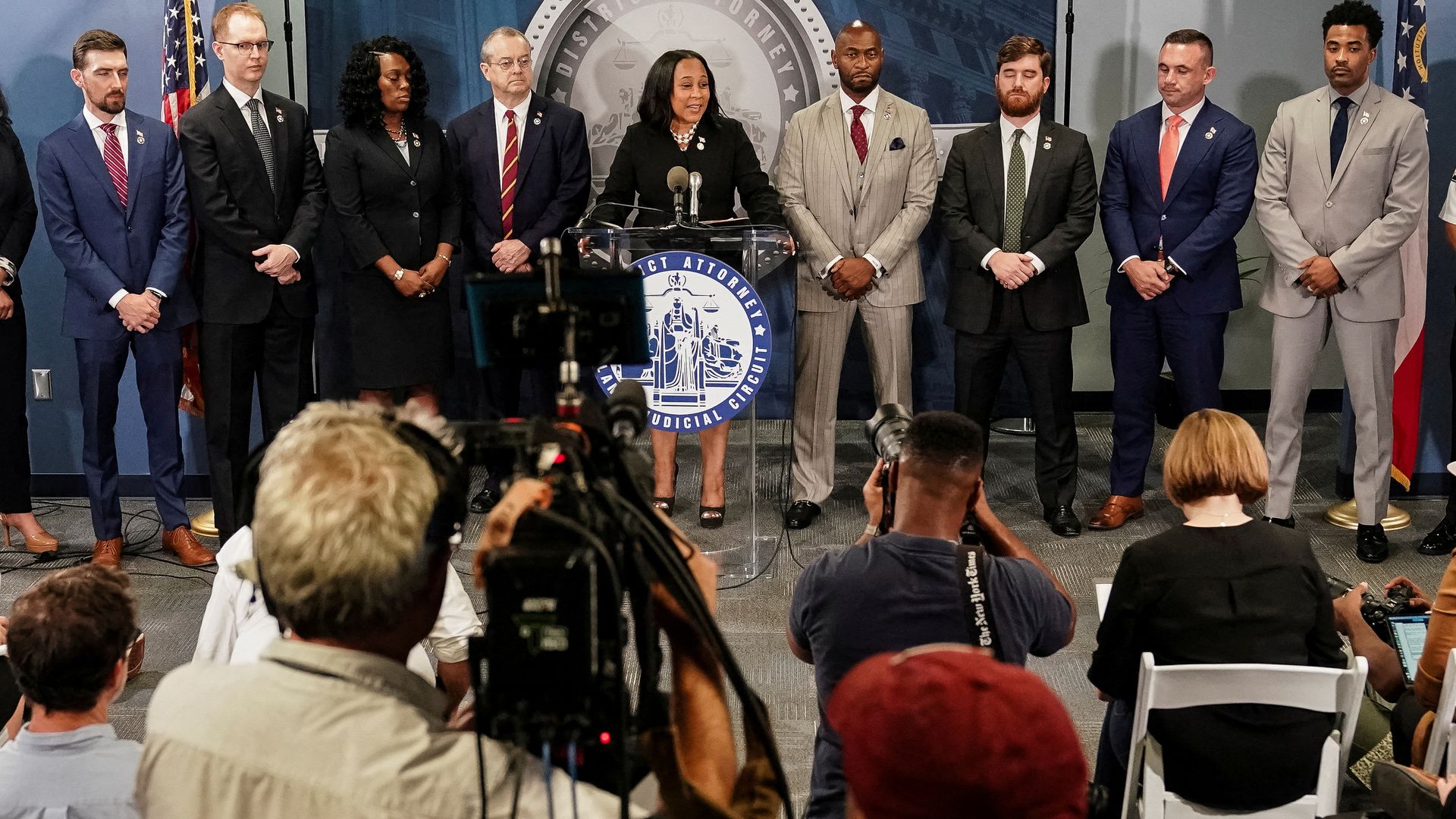Fulton County District Attorney Fani Willis announced a sweeping indictment that included 41 charges and named 19 defendants, including former President Donald Trump. All 19 defendants were charged with violating Georgia’s RICO (Racketeer Influenced and Corrupt Organization) Act.
Notable co-defendants include former White House Chief of Staff Mark Meadows, former Justice Department official Jeffrey Clark, and a handful of Trump lawyers. Named lawyers include:
- Rudy Giuliani.
- John Eastman.
- Sidney Powell.
- Kenneth Chesebro.
- Jenna Ellis.
- Ray Smith.
“Trump and the other defendants charged in this indictment refused to accept that Trump lost, and they knowingly and willfully joined a conspiracy to unlawfully change the outcome of the election in favor of Trump,” the indictment reads. “Defendants… constituted a criminal organization whose members and associated engaged in various related criminal activities including, but not limited to, false statements and writings, impersonating a public officer, forgery, filing false documents, influencing witnesses, computer theft, computer trespass, computer invasion of privacy, conspiracy to defraud the state, acts involving theft and perjury.”
False statements to and solicitation of state Legislature, high-ranking state officials
The indictment alleges several of the defendants made false statements regarding voter fraud during several hearings in front of the Georgia General Assembly.
According to the indictment, “the purpose of these false statements was to persuade Georgia legislators to reject lawful electoral votes cast by the duly elected and qualified presidential electors from Georgia.”
“Members of the enterprise corruptly solicited Georgia legislators instead to unlawfully appoint their own presidential electors for the purpose of casting electoral votes for Donald Trump,” the indictment read.
The indictment also accused defendants of making false statements to various high-ranking state officials, including Gov. Brian Kemp, R-Ga., incoming state House Speaker David Ralston, and Georgia Secretary of State Brad Raffensperger.
Creation and distribution of false Electoral College documents
The indictment accused several defendants of creating false Electoral College documents. False Electoral College votes were allegedly cast at the Georgia State Capitol on Dec. 14, 2020.
“After the false Electoral College votes were cast, members of the enterprise transmitted the votes to the President of the United States Senate, the Archivist of the United States, the Georgia Secretary of State, and the Chief Judge of the United States District Court for the Northern District of Georgia,” the indictment reads. “The false documents were intended to disrupt and delay the joint session of Congress on January 6, 2021, in order to unlawfully change the outcome of the November 3, 2020, presidential election in favor of Donald Trump.”
Harassment and intimidation of Fulton County election worker Ruby Freeman
The indictment accused several of the defendants of falsely accusing Fulton County election worker Ruby Freeman of committing election crimes.
According to the indictment, “members of the enterprise traveled from out of state to harass Freeman, intimidate her, and solicit her to falsely confess to election crimes that she did not commit.”
Solicitation of high-ranking Justice Department officials
The indictment accused several defendants of soliciting high-ranking Justice Department officials to make false statements to government officials in Georgia.
In one instance, according to the indictment, Trump told the acting U.S. attorney general to “say that the election was corrupt, and leave the rest to me and the Republican congressmen.”
Solicitation of the vice president of the United States
The indictment accused several of the defendants of soliciting Vice President Mike Pence to reject the Electoral College votes cast in Georgia.
Unlawful breach of election equipment
The indictment accused several defendants of conspiring to unlawfully access voting equipment and voter data. According to the indictment, ballot images voting equipment software and personal voter information were stolen.
“Members of the enterprise, including several of the Defendants, filed false documents, made false statements to government investigators, and committed perjury in judicial proceedings in Fulton County, Georgia, and elsewhere in furtherance of and to cover up the conspiracy,” the indictment read.
The RICO portion of the indictment also listed 161 individual acts “in furtherance of the conspiracy.” Notable alleged acts involving Trump include a Nov. 4, 2020, speech in which Trump declared victory in the election.
“Approximately four days earlier… Trump discussed a draft speech with unindicted co-conspirator individual 1, whose identity is known to the grand jury, that falsely declared victory and falsely claimed voter fraud,” the indictment read.
The indictment accused Trump and Meadows of requesting former Trump aide John McEntee to “prepare a memorandum outlining a strategy for disrupting and delaying the joint session of Congress on Jan. 6, 2021.” Various Trump tweets from this period of time were mentioned in the RICO section, as well as the phone call in which Trump asked Raffensperger to find “11,780 votes.”
Outside of alleged RICO Act violation, other charges Trump faces related to the Georgia indictment include:
- Three counts of solicitation of violation of oath by public officer.
- Conspiracy to commit impersonating a public officer.
- Two counts of conspiracy to commit forgery in the first degree.
- Two counts of conspiracy to commit false statements and writings.
- Conspiracy to commit filing false documents.
- Filing false documents.
- Two counts of false statements and writings.
One top RICO lawyer told Straight Arrow News’ Ray Bogan that Trump’s legal team will get this case successfully moved to federal court because he was president when the alleged acts took place.
“As an officer of the United States being charged with a violation of the law of the state of Georgia, under concepts of federalism, a officer of the United States can, on motion, require the case to be transferred to the United States District Court,” Maloy, Jenkins, Parker partner Buddy Parker said.
According to Parker, Wilis would still prosecute the case under the Georgia state statutes, but it would be heard by a District Court Judge in the Northern District of Georgia under the federal rules of evidence and criminal procedure. A judge could deny the motion.











